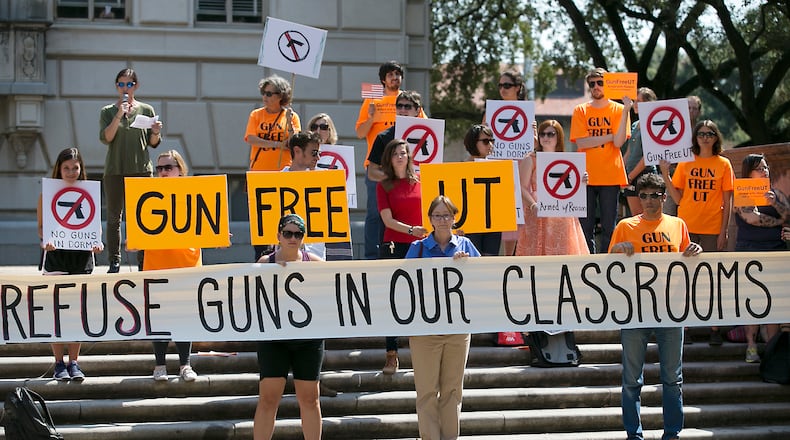Many folks are saying on social media posts they won't send their kids to Georgia public colleges now that Gov. Nathan Deal signed campus carry into law, but will have them attend out-of-state schools.
Parents will have to choose carefully as other states allow guns on campuses, although many give more autonomy to the universities to make the final decision. The new Georgia law does not give public college leaders, parents or students any ability to reject guns in their midst and in their classrooms. (People seem confused on the classroom provision; Georgia's new law only bans guns in classrooms where there are dual enrolled high school students.)
Make no mistake. This law will have repercussions as only a handful of states have gone this far in forcing their institutions of higher education to accept firearms. Georgia is not joining an illustrious or enviable list.
Here is a summary of state laws from the National Conference of State Legislatures: (I updated the info on Georgia.)
In 23 states the decision to ban or allow concealed carry weapons on campuses is made by each college or university individually: Alabama, Alaska, Arizona, Connecticut, Delaware, Hawaii, Indiana, Iowa, Kentucky, Maine, Maryland, Minnesota, Montana, New Hampshire, Ohio, Oklahoma, Pennsylvania, Rhode Island, South Dakota, Vermont, Virginia, Washington and West Virginia.
Because of recent state legislation and court rulings, 10 states now have provisions allowing the carrying of concealed weapons on public postsecondary campuses. These states are Georgia, Arkansas, Colorado, Idaho, Kansas, Mississippi, Oregon, Texas, Utah and Wisconsin. Not included in above list, Tennessee allows faculty members with licenses to carry weapons on campus but the law does not extend to students or the general public.
Recently passed Kansas legislation creates a provision that colleges and universities cannot prohibit concealed carry unless a building has "adequate security measures." Governing boards of the institutions, however, may still request an exemption to prohibit for up to four years. Wisconsin legislation creates a provision that colleges and universities must allow concealed carry on campus grounds. Campuses can, however, prohibit weapons from campus buildings if signs are posted at every entrance explicitly stating that weapons are prohibited. All University of Wisconsin system campuses and technical community college districts are said to be putting this signage in place. Legislation passed in Mississippi in 2011 creates an exception to allow concealed carry on college campuses for those who have taken a voluntary course on safe handling and use of firearms by a certified instructor.
Recent court cases have also overturned some long-standing systemwide bans of concealed carry on state college and university campuses. In March 2012, the Colorado Supreme Court ruled that the University of Colorado's policy banning guns from campus violates the state's concealed carry law, and in 2011 the Oregon Court of Appeals overturned the Oregon University System's ban of guns on campuses, allowing those with permits to carry concealed guns on the grounds of these public colleges (Oregon's State Board of Higher Education retained its authority to have internal policies for certain areas of campus, and adopted a new policy in 2012 that bans guns in campus buildings). In both cases, it was ruled that state law dictates only the legislature can regulate the use, sale and possession of firearms, and therefore these systems had overstepped their authority in issuing the bans. See the "Guns on Campus: Campus Action," page for more information on these rulings, board policies and other campuses that allow concealed carry on their grounds.
About the Author




